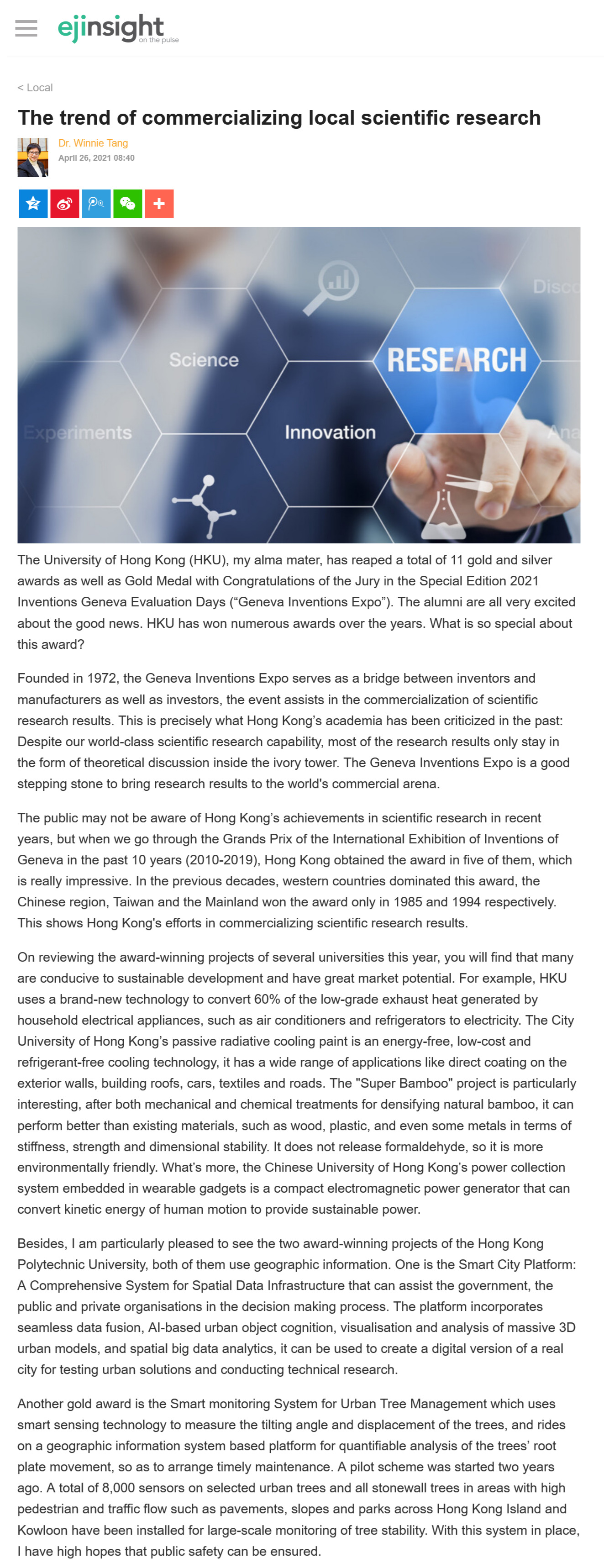網上版請按此

The trend of commercializing local scientific research
The University of Hong Kong (HKU), my alma mater, has reaped a total of 11 gold and silver awards as well as Gold Medal with Congratulations of the Jury in the Special Edition 2021 Inventions Geneva Evaluation Days ("Geneva Inventions Expo"). The alumni are all very excited about the good news. HKU has won numerous awards over the years. What is so special about this award?
Founded in 1972, the Geneva Inventions Expo serves as a bridge between inventors and manufacturers as well as investors, the event assists in the commercialization of scientific research results. This is precisely what Hong Kong's academia has been criticized in the past: Despite our world-class scientific research capability, most of the research results only stay in the form of theoretical discussion inside the ivory tower. The Geneva Inventions Expo is a good stepping stone to bring research results to the world's commercial arena.
The public may not be aware of Hong Kong's achievements in scientific research in recent years, but when we go through the Grands Prix of the International Exhibition of Inventions of Geneva in the past 10 years (2010-2019), Hong Kong obtained the award in five of them, which is really impressive. In the previous decades, western countries dominated this award, the Chinese region, Taiwan and the Mainland won the award only in 1985 and 1994 respectively. This shows Hong Kong's efforts in commercializing scientific research results.
On reviewing the award-winning projects of several universities this year, you will find that many are conducive to sustainable development and have great market potential. For example, HKU uses a brand-new technology to convert 60% of the low-grade exhaust heat generated by household electrical appliances, such as air conditioners and refrigerators to electricity. The City University of Hong Kong's passive radiative cooling paint is an energy-free, low-cost and refrigerant-free cooling technology, it has a wide range of applications like direct coating on the exterior walls, building roofs, cars, textiles and roads. The "Super Bamboo" project is particularly interesting, after both mechanical and chemical treatments for densifying natural bamboo, it can perform better than existing materials, such as wood, plastic, and even some metals in terms of stiffness, strength and dimensional stability. It does not release formaldehyde, so it is more environmentally friendly. What's more, the Chinese University of Hong Kong's power collection system embedded in wearable gadgets is a compact electromagnetic power generator that can convert kinetic energy of human motion to provide sustainable power.
Besides, I am particularly pleased to see the two award-winning projects of the Hong Kong Polytechnic University, both of them use geographic information. One is the Smart City Platform: A Comprehensive System for Spatial Data Infrastructure that can assist the government, the public and private organisations in the decision making process. The platform incorporates seamless data fusion, AI-based urban object cognition, visualisation and analysis of massive 3D urban models, and spatial big data analytics, it can be used to create a digital version of a real city for testing urban solutions and conducting technical research.
Another gold award is the Smart monitoring System for Urban Tree Management which uses smart sensing technology to measure the tilting angle and displacement of the trees, and rides on a geographic information system based platform for quantifiable analysis of the trees' root plate movement, so as to arrange timely maintenance. A pilot scheme was started two years ago. A total of 8,000 sensors on selected urban trees and all stonewall trees in areas with high pedestrian and traffic flow such as pavements, slopes and parks across Hong Kong Island and Kowloon have been installed for large-scale monitoring of tree stability. With this system in place, I have high hopes that public safety can be ensured.
Dr. Winnie Tang
Adjunct Professor, Department of Computer Science, Faculty of Engineering; Department of Geography, Faculty of Social Sciences; and Faculty of Architecture, The University of Hong Kong